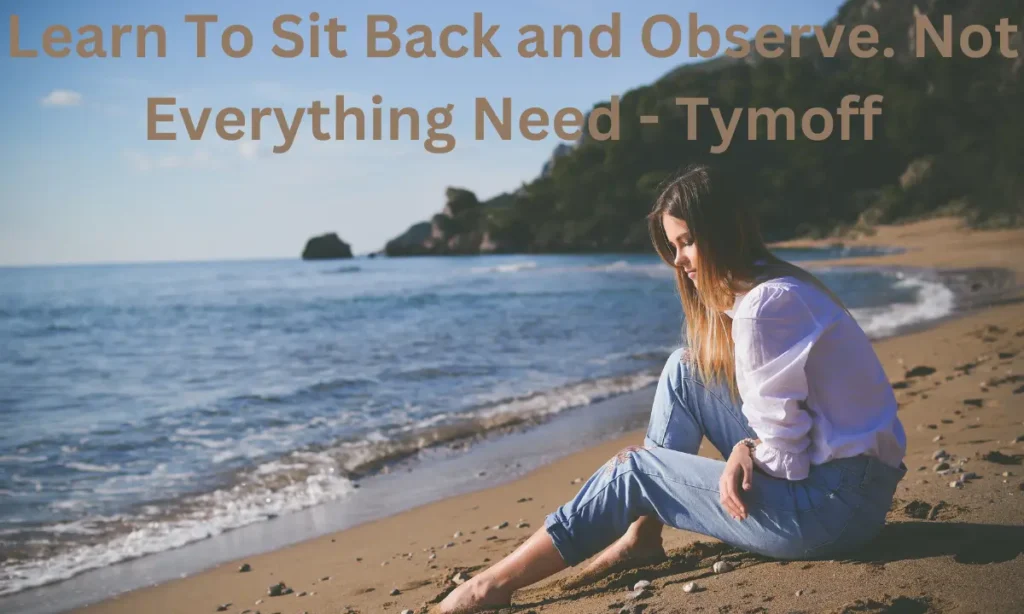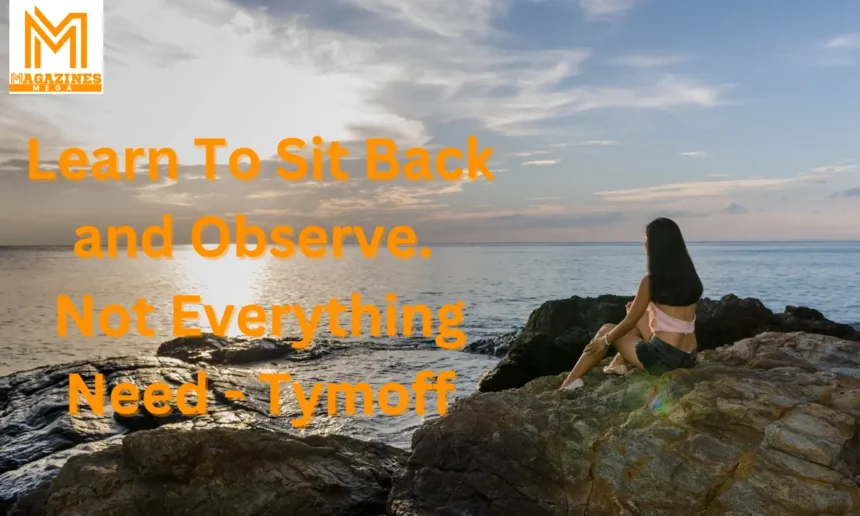Do you sometimes find yourself swept up into the vortex of immediate reactions and then wish afterwards that you had stopped to think? In today’s fast-moving world, the ability to step back and observe rather than to react on the spur of the moment is a valuable asset. Not only does it prevent us from dealing with undue stress, but it also helps us make better decisions. In this detailed exploration, we will discover about “Learn To Sit Back and Observe. Not Everything Need – Tymoff“
Understanding the Essence of Observation
Defining Observation and Its Importance
Observation transcends mere seeing it is something intentional and mindful of our surroundings as well as our own world. It calls for attention to minute details, an understanding of the unseen relations, and inhibition of judgment or response as a first move. The conscious practice thus builds such exceptional understanding of life’s situations to navigate complexities with ease and insight.
A Glimpse into History’s Observers
It has been well appreciated throughout history as something of great value by philosophers, leaders, and thinkers of old and present-from the old sages like Socrates who glorified reflection as a means towards wisdom to the modern mindfulness movements which actually also speak of the same old principles of life. The unwavering admiration for observation points out its indispensable position in both individual and collective progress.
The Art of Restraint: Why You Need Not React to Everything
Tapping into Emotional Intelligence
EI ability to see and understand one’s own as well that of others and to work on them, but to observe more than to respond. By using EI through this aspect of observation and self-reflection, we then can be more precise in our analysis of the situation, provide measured responses that are appropriate as well as empathetic, and thus create healthier interactions and environments.
Minimizing Unnecessary Stress
Inasmuch as these immediate reactions may indeed escalate the situation and create unnecessary stress, giving ourselves room to observe first will allow us to process our emotions and responses in a more reflective manner. Such restraint not only alleviates undue tension among ourselves but also decreases friction when interacting with others, thus facilitating more harmony in life.
Far-reaching Benefits of Observing
Enhanced Understanding
In observation, we become more perceptive of people, situations, and environments. We get to know them better in order to develop further with our relationships, prepare ahead of problems, and face complexities more easily and boldly.
Developing Better Decision-Making Ability
Some of the information and insights observation equips us with are invaluable, and these are believed to influence our informed decisions best. This means that we would be making good choices that can be well thought through and based on the desires and goals and values we hope for, thereby increasing the probability of successful results.
Becoming a Mindfulness Practitioner: Developing the Practice of Observation
Being mindful simply means being in the moment and fully present. This is where mindfulness helps focus our attention on our everyday routine in appreciating the presence and aware state, which otherwise might go unnoticed.
Learning the Art of Active Listening

One of the main bases of successful observation is active listening, which is giving the full attention of listening first then understanding the message and responding accordingly. While sharpening listening skills, one becomes much better in recognizing non-verbal behavior as well as underlying emotions that make interactions more meaningful and productive.
Refined Mindfulness Techniques
Integrative Meditation Techniques
Meditation is also a good tool to control one’s mind and sharpen the observational power. Guided meditation, body scan, and loving-kindness meditation all help to achieve a state of concentrated, non-judgmental awareness- the key to effective observation.
Focussed Breathing Techniques
Breathing exercises are simple and strong techniques to set ourselves in the here and now. Some of the breathing techniques, including deep diaphragmatic breathing and the 4-7-8 technique, have been proven to reduce stress and increase the ability to focus, thus having clarity of observation in the self and the surroundings.
- Active Listening: The Art of Effective Observation
- To actively listen, follow these practices: Establish eye contact-showing interest and respect.
- Nod and Use Affirmative Gestures: These non-verbal cues tell others that you’ve heard them.
- Ask Clarification Questions: One good way to guarantee that their message cuts into your mind.
- Don’t Interrupt the Speaker: Wait until he or she has reached the point that you can respond.
The Ripple Effects of Active Listening
Active listening builds observation skills but also gives a deeper, trustful ground on which relationships stand. It opens an opportunity for clear communication and collaborative problem-solving, making personal and professional relationships all the more beautiful and productive.
Real-Life Example Stories Grounded in Observation
Idea Gained from Business Icons
Many successful business executives attribute their achievements to their strong observing abilities. Steve Jobs, for example, is known to have been very perceptive of market trends and about the needs of consumers through diligent observation. His observations led to innovative discoveries and the setting up of Apple as a technology leader.
Transformational Stories of Individuals
Those who are observant demonstrate personal growth and increased self-awareness. There are countless stories of people who made it through tough situations, improved their relationships, and reached goals by watching and reflecting on life.
Avoiding the Quagmire of Overreaction
Stress and Anxiety Management
The overreaction will only make things worse as stress and anxiety are intensified, engrossing a person in a bad feedback loop of emotions and reactions. Observation, however, teaches a person a cycle breaker, a prepared approach to conditions without feelings of tenseness and stress but with a composed sense that will help stabilize their emotions.
Stress Reduction When Maintaining Relationship Tensions
In relations, overreacting can, at times, lead to false assumptions and conflict. Observation proves to be handy in flushing out the views and feelings of others, for example, and instead makes the relations proceed or become smoother and supportive, helping people bond and settle disputes with more efficiency.
Pattern of Non-Reactive Thinking
Understanding and Knowing Triggers
The path to a non-reactive mind will start with determining what triggers our automatic reactions. Once we know the triggers that set off our immediate reactions, we can work on finding solutions to develop short pauses between detecting and responding situations, thus eliminating impulsivity as well as creating an even more meaningful connection approach.
Creating a Calm Environment
Creating a quiet and peaceful atmosphere is a conductive way to develop effective observation. Be it a quiet corner in one’s home, the silent features of nature, or an empty space at work, a tranquil setting enforces our ability to look, think, and reflect without external enticements.
Patience at the Heart of Observation
Patience as a Prime Virtue
Observational practice requires patience. It helps in waiting for the right moment to act and resisting acting impulsively because we would be made to wait. We even tend to hold a poised steady behavior even during the most trying situations. Practicing patience requires consistent effort and awareness.
Long-term benefits
There are so many long-term benefits to patience. It leads to improving relationships, better decisions, and having a more peaceful state of mind. The more time passes, the more patience is bound to become a natural response; therefore, our total quality of life and ability to weather difficulties will improve over time.
Observation in the Professional Sphere
Improving Workplace Relationships
With the insight of observation in professional settings, it is possible to understand the colleague’s strength, motivation, and dynamics. Understanding, then, paves the way for collaboration, facilitates teamwork, and creates a work environment where everyone can thrive.
Optimized Management Practices
For effective leadership, keen observation is essential to the managers. They can assess how employees are performing, what they have to improve on, and ways to increase the productivity and morale of people. Because of this observation skill, observant managers can pattern their practice according to the needs of the team and, thus, help achieve organizational success.
Application of Observation Skill in Personal Life
Enhancing Interpersonal Relations
This enables one to answer people with more empathy and understanding as we learn from the behaviors and emotions of our loved ones. It enhances the relationships we have, solves conflicts better, and starts a mutual trust and respect foundation about personal relationships with people.
Improving Self-Awareness and Personal Growth
One of the most effective tools for self-awareness is that of observation-that is, merely paying attention to our thoughts, actions, and emotions. Doing so opens the way to a knowing of our motivations, habits, and all the rest. It allows for growth and change in the best possible ways.
Dissecting Obstacles in the Pursuit of Observation
Taming Impulsiveness
Such an observant approach would also face several other major impediments, which are the overcoming of our innate impulsive tendency and the need for practice and self-discipline in the development of strategies for pausing before reacting.
Dealing with Modern Diversions
It’s rather simple to become distracted by today’s distractions, but learning to filter all that surrounds you to focus is a lot of development in order to observe well. Techniques in the area include boundary setting, keeping digital disturbances to a minimum, and creating structured routines that help keep your concentration on track.
Conclusion
It can really change your life just to simply sit back and observe rather than react. It reduces stress, builds and improves relationships, and makes for better-informed and more effective decision-making. With mindfulness practice, active listening, and patience, observation becomes a habit that shines through into your daily living, personal and professional life. So start today with small steps toward a more reflective and discerning approach, and see the remarkable changes unfold.
FAQs
Why is observation important?
Observation promotes understanding, reduces impulsive reactions, and leads to better decision-making in personal and professional settings.
How can I improve my observation skills?
Practice mindfulness, active listening, and patience to develop stronger observational habits in daily life and interactions.
What benefits come from observing first?
Observing before reacting reduces stress, enhances relationships, and leads to more thoughtful, informed decisions.
Also Read About: Zefoy: Increase TikTok Follwers 100% Free, Download






